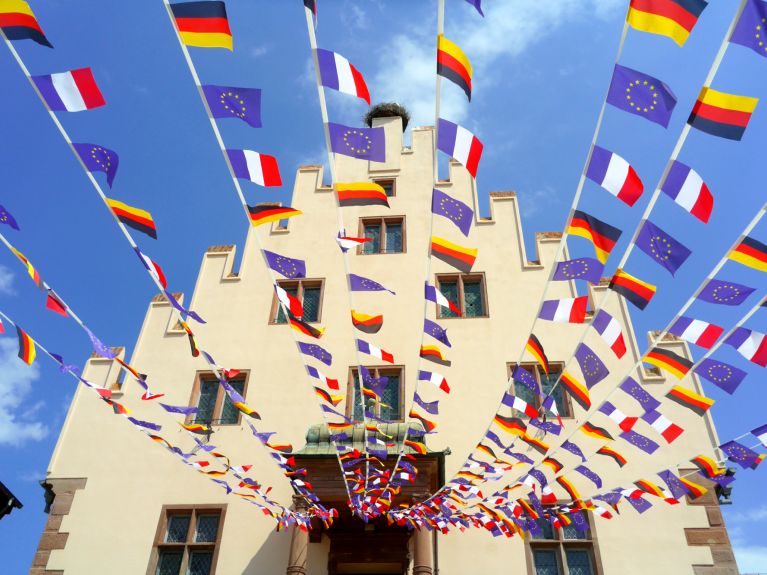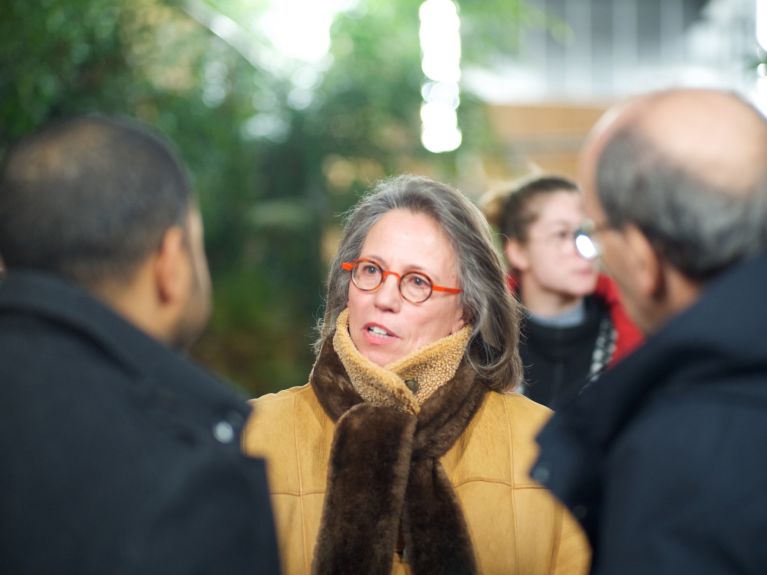For the citizens of both countries
From Élysée Treaty to the Treaty of Aachen: Sabine Thillaye explains why Franco-German friendship needs fresh impetus.

France and Germany set an example for friendship and cooperation in 1963 with the signing of the Élysée Treaty. Now, 56 years later, it has a successor: the Treaty of Aachen. Sabine Thillaye heads the French side of the relevant Franco-German working group. Her own biography is a Franco-German success story: German by birth, she now helps shape policy in the French National Assembly and is chairwoman of the Committee for European Affairs.
Ms Thillaye, what expectations do you have of the Treaty of Aachen?
We hope to find a new pace for our cooperation in Aachen. In recent years the impression has emerged in public discourse, sometimes also in politics, that the Franco-German friendship established in 1963 with the advent of the Élysée Treaty has become stuck in a rut. In light of the turbulent events of recent weeks, I believe it is especially important to make clear that although it is a treaty between states, its core is intended to benefit all citizens of the two countries. This aspiration is underlined by the status the Aachen Treaty gives regional cooperation.
Digitalisation is a new topic. What is the Treaty of Aachen meant to achieve here?
The new Élysée Treaty aims to strengthen our starting position with regard to digitalisation. Instead of just reacting to the frequently cited disruptions, we want to ensure that in future important impetuses come more often from France, Germany and the European Union. The Aachen Treaty is intended to strengthen our cooperation in research, especially on the subject of artificial intelligence. In addition to research, in the long term we would like to see the development of European champions, large enterprises with the potential to compete with American and Chinese tech giants.

Germany’s foreign minister, Heiko Maas, places special emphasis on education. How should forces there be focused even more strongly?
Priority must again be given to encouraging people to learn the partner country’s language. The promotion of German language teaching in France has been neglected in recent years. This should change after the signing in Aachen. Furthermore, the harmonisation of qualifications and certificates should further facilitate crossborder exchange.
Which part of the Aachen Treaty is especially close to your heart?
The most important part of the agreement to me is perhaps the commitment to the European integration process. When it comes to the European elections in May I would like the Franco-German relationship and its strengthening in the wake of the new Élysée Treaty to be perceived and accepted in the rest of Europe less as an attempt to push ahead and more as an effort to lead the way.
Do you see yourself as a good example of Franco-German friendship?
My biography reflects the historically close partnership between Germany and France. That’s important to me: if I have been involved in deepening the partnership between the two countries as a member of the French National Assembly and in the negotiations for the new Franco-German friendship treaty, I owe this to the work that earlier generations have achieved since 1963. In the other direction, I naturally hope that biographies like mine will be the rule rather than the exception in the future.
We must find our way to a healthy form of “Europragmatism”
How has Franco-German friendship changed since 1963?
In 1963 Franco-German cooperation was based on the desire and the need after the end of the Second World War to reconcile two peoples that had long been enemies. This difficult legacy naturally continues to play an important role, most recently as part of the remembrance of the end of the First World War in November 2018. In the past decades, however, we have engaged in exchange, got to know one another and learned to work together. Today, with the signing of the new treaty, I believe we have arrived at a point where Franco-German relations are reaching maturity.
Are nationalist and anti-EU parties a threat to democracy?
I naturally observe developments from the nationalist tendencies in the eastern European member states and the protest parties in western Europe to Brexiteers in the United Kingdom and the “yellow vests” in France with concern. And, of course, we must condemn attacks on the rule of law. Nevertheless, I believe that all convinced Europeans have good reasons to approach the forthcoming European elections with self-confidence.
It is important for us to stop praising Europe to the heavens one minute and damning it the next in the course of national debate. Instead of swinging from one extreme to the other, between Europhile and Europhobe, we must find a healthy form of “Europragmatism”. We must again show the voters that European unification is not an end in itself, but an instrument for solving common problems, which individual states can simply no longer solve alone.
Interview: Philipp Hallfahrt
You would like to receive regular information about Germany? Subscribe here to:
